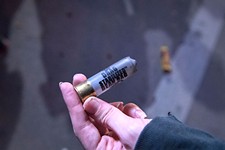Still Looking for the Truth at APD
Chief Knee may be guilty of the same offense for which he fired an officer
By Jordan Smith, Fri., Feb. 4, 2005

Austin Police Officer Timothy Little's employment troubles may be over – but trouble is now brewing for APD Chief Stan Knee (see "When Is a Lie Not a Lie?," Jan. 21). Late last week, the independent arbitrator hired to consider Little's civil service appeal overturned Knee's decision to fire Little for failing to report an officer-involved 911 call and then falsifying a government document in order to "cover" for the officer. According to arbitrator Herman Bennett, Knee's decision to terminate Little was too harsh. There was "too much disparity between the termination imposed on [Little] and [the] far lesser discipline imposed on officers [who, in the past,] engaged in the same or similar conduct," Bennett wrote. Bennett reversed the termination and imposed a 90-day suspension, retroactive to Oct. 10, the day Little was fired – meaning Little should be back on duty this week. "He's extremely happy," said Little's attorney Tom Stribling.
By contrast, Knee has taken Little's place on the hot seat, in connection with his testimony during Little's arbitration. That testimony has called into question Knee's own "credibility and integrity" – the very factors he cited in terminating Little. Little was fired after failing to report his contact with a fellow officer, Vernon Stevenson, after Little responded to a 911 hang-up call made from Stevenson's apartment on March 13. Stevenson initially denied making the call, before admitting to Little that he had called after getting into an altercation with his girlfriend, Jennifer Tomeff, an APD dispatcher. (APD investigators ultimately determined that Tomeff was the aggressor in the fight.) Since Tomeff had left the home and Little believed Stevenson's account, Little officially reported via his patrol car computer that there was no response at the home – effectively "falsifying a government document." Almost immediately, Little realized he'd made a grave error – in both judgment and deed – and confessed the mistake to supervisors.
APD Internal Affairs and the department's officer-involved crime unit investigated the incident, and in September a Travis Co. grand jury no-billed Little on the record-tampering charge. But in October, Knee fired Little, condemning his behavior as having forever undermined his integrity and credibility. Yet in handling the case, Knee himself made apparently intentional misrepresentations in order to stall the final disposition of the administrative inquiries into both Little and Stevenson's conduct.
Little's case records reflect that the department's criminal inquiry into his conduct was completed in June. Yet it wasn't until two months later, on Aug. 10, that Knee wrote a letter to Texas Attorney General Greg Abbott, requesting an extension of the civil service law's 180-day window for imposing discipline. (In Little's case that window would've closed on Sept. 10.) The legal extensions are intended for cases in which the handing out of administrative discipline may jeopardize an ongoing, and underlying, criminal inquiry – something that, according to Knee's own investigators, was not an issue in this case.
Questioned about that contradiction, Knee testified that he wrote the letter not because there was an "active" criminal inquiry going on within the department, but because he didn't yet know whether the Travis Co. District Attorney's office might want to present Little's case to a grand jury. "We don't want the administrative to hinder the criminal [investigation] in any way whatsoever," he testified on Jan. 11. "We consider [the criminal investigation] completed after the [DA] advises us that he has no further interest in the case or the grand jury rejects the case." Unfortunately, the DA's office doesn't share Knee's understanding. Assistant DA Claire Dawson-Brown told the Chronicle that the DA's office tries to keep its inquiry separate from the APD's administrative review – especially because the APD must follow a civil service timetable. "[W]e don't interfere with those," she said. "We really do try to keep them separate."
Knee may be able to defend his request for an extension in Little's case, but in Stevenson's case his justification for a similar request collapses. Stevenson's conduct was also reviewed by criminal and administrative investigators, and on Aug. 11 (one day after he signed the Little extension request), Knee again asked the AG's office to extend the disciplinary period, this time for Stevenson. Knee wrote that he needed an extension in order to protect the criminal case and that, "based on information available to me at this time, I intend to order an indefinite suspension of Officer Stevenson." Unfortunately for Knee, the department had finished its criminal inquiry into Stevenson's conduct that spring – on April 6, Knee had already been told that the DA's office wasn't interested in pursuing a case against Stevenson. In other words, by Knee's own definition, the criminal case against Stevenson had been "closed" four months before he wrote to the AG.
Asked about that letter under oath, Knee admitted he had no reason to believe that Stevenson would be fired. "I believe that that's an incorrect statement," he said about the content of his letter. "I signed it because I wanted to extend the 180 days." Thus, it appears Knee may be guilty of "falsifying a government record" – the same infraction for which he tried to fire Little. (Incidentally, Stevenson was not disciplined for his conduct in the case, although he gave apparently conflicting statements to investigators.)
According to Assistant City Manager Rudy Garza, Knee has requested that the city review his conduct. Garza says that he and City Manager Toby Futrell "sat down and talked" with Knee, and the chief asked that City Attorney David Smith review the letters he wrote to the attorney general, the transcript of his arbitration testimony, and the applicable section of the Local Government Code. Garza added that Smith will speak "directly" with the DA's office regarding the process for reviewing cases against officers. Smith's review should be completed by the end of this week, and he will brief Futrell and Garza. "At that point, the city manager will give any further directions."
Got something to say on the subject? Send a letter to the editor.










